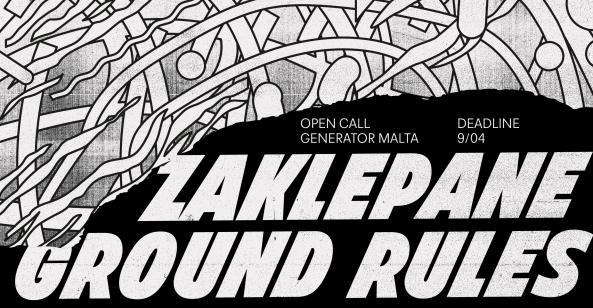
Malta Festival will produce 9 out of 111 works submitted to “Zaklepane / Ground Rules”, Generator Malta programme. The winning works from the area of art and activism, touching upon the earth’s social context, will be on display in Wieniawski Park during the festival’s 31rd edition in June.
The jury composed of Iwo Borkowicz, Ola Korbańska, Marta Jalowska, Joanna Pańczak and Sonia Borkowicz selected 5 projects which will become part of Generator Malta, and in addition decided to reward 4 more which will also be produced during Malta Festival.
The organizers would like to thank all those who prepared their project proposals focused on the subject of the earth, its resources and land ownership rights. Among the 111 submitted proposals, there were 31 works from abroad. The verdict of the “Zaklepane / Ground Rules” jury is as follows:
Winners:
Maria Dutkiewicz & Karolina Wajman “Mój dom to mój dół" (“My home is my hole”) – for honesty, sense of humour and strength in a simple gesture. In a personal and blunt manner, the project exposes a particularly relevant subject of the housing crisis and its injustice, turning the fortress into a temporary, yet one’s own home as well as a site for field studies.
Edka Jarząb / Kolektyw Uskoki “Uskoki FM" – for including, by means of radio waves, the audio sphere in the discussion on the earth, territory and influences. The project rests on the fortress’s potential to guarantee independence – for 48 hours the fortress becomes a seat of a radio station and an autonomous area. For its pirate-like spirit, activist elements and inclusiveness.
Anna Kędziora “Kwiaciarnia" (“Flower Shop”) – for touching upon the issue of expansive urban development which (often irrevocably) gets rid of human and non-human inhabitants. For transforming the fortress into a temporary shelter for plant fugitives from endangered areas, involving experts to get know them better and festival participants to provide care to them.
Luca Spano “For Sale" – for using the fortress to expose the mechanisms of capitalist land transactions, driving the spiral of speculation. For employing the medium of photography which enables the earth to become a “visual estate" – a real estate that can be owned in the form of an image.
Karolina Szczypek “Czasami nie rozumiem kim jest ziemia" (“Sometimes I don’t understand who earth is”) – for bringing back hope by giving legal personality to a piece of land. It goes a step further than iwola’s declaration of independence of a piece of territory, towards its emancipation and subjectification. For an attempt to create a precedent, undertaking legislative actions and including the inhabitants in this process.
Special awards:
Oriol Fuster Cabrera “Polacos Space / Catalan Pavilion" – for a provoking presentation of the earth in the context of cultural background, territorial and linguistic interconnections, based on the example of the Spanish word “polacos”, and its usage in colloquial speech. The project uses the fortress’s independence to create a “Catalan Pavilion” inside it.
Paula Kaniewska “Strefa wydobycia Poznań” (“Extraction Zone Poznań”) – for discovering gas, oil and brown coal deposits in Poznań geological maps, and drawing attention to their dangerous causative power in shaping the future. For a speculative project which allows Poznań inhabitants to understand the situation of resettled communities and those deprived of power to decide about the earth, for the benefit of global corporations and exploiting resources.
make LARMO (Paulina Woźniczka, Weronika Krupa) “Hałda wulkaniczna ziemia" (“Slag heap volcanic earth”) – for “loving the damaged grounds”, that is discovering the potential of post-mining, useless and dangerous slag heaps created by men. For the idea to reinterpret the relationship between man and earth by looking at post-industrial areas as a place of cult.
new visions (Margaret Amaka Ohia-Nowak, Agnieszka Bułacik) “Ta ziemia nie należy do nas, to my należymy do tej ziemi" (“This earth does not belong to us, we belong to it”) – for taking up the subject of exploitation and unfair use of earth in the context of colonialism. For sensitivity and undermining the status quo, and common cultural mechanisms by attempting to “decolonize the minds and bodies” of festival participants.